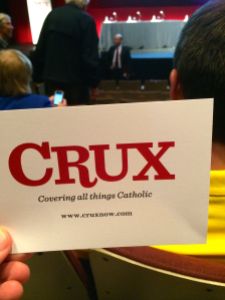
When a major world leader is elderly and and has been sick for as long as Pope Francis was, news organizations have a lot of time to prepare. And so it was with the Catholic press, which was ready when Francis died earlier today at 88.
NPR reporter Sylvia Poggioli, a legend in her own right, has written a lengthy obituary in which she observes:
The outspoken pope lent his voice to almost every modern issue facing the world, often taking the side of the marginalized and vulnerable. He spoke out against commercial exploitation of the environment, rich countries’ unwillingness to accept migrants, the alienation caused by technology and the lucrative sale of weapons of war.
Now for a roundup of some leading Catholic publications. I’ll start with Crux, the digital outlet launched by Boston Globe Media to take advantage of the initial excitement over the Francis papacy. The Globe cut it loose years ago, but Crux continues as an independent website. Editor John L. Allen Jr. writes:
This was the pontiff, after all, who took the name “Francis” in homage to Catholicism’s most iconic and beloved saint, the “little poor man” of Assisi; the pope who rejected the marble and gold of the Papal Apartments in favor of the Domus Santa Marta, a modest hotel on Vatican grounds; the pope who returned to the clerical residence where he’d stayed prior to his election to pack his own bag and to pay his own bill; and the pope who, 15 days later, spent his first Holy Thursday not in the ornate setting of St. Peter’s Basilica, but at a youth prison in Rome where he washed the feet of 12 inmates, including two Muslims and two women.
In a similar vein, Gerard O’Connell of America magazine stresses the pope’s humility. The magazine, by the way, is a Jesuit publication, and Francis was the first Jesuit pope. O’Connell says:
From the moment he took office, Francis astounded Vatican officials as he began to dispense with the trappings of worldly power and status that had been features of the papal court for centuries. He refused the gold cross and ring and the papal mozzetta, the short cape previous popes had worn. On his first morning as pope, he insisted on riding in a small economy car, not the papal limousine, and without police escort to the Basilica of St. Mary Major to pray before the revered icon of Our Lady, Protectress of the Roman People. Afterward, he went to pay his bill at the Vatican residence for clergy where he had resided before the conclave.
National Catholic Reporter, a liberal publication, notes that Francis did not make much progress on the position of women in the church despite his inclusive rhetoric. Joshua J. McElwee puts it this way:
A disappointment for many Catholics was Francis’ relatively slow movement with regards to opening leadership roles for women in the church. Although he made strides later in his papacy — opening all Vatican positions, including top posts, to women and allowing lay men and women to vote at synod meetings — Francis leaves the Vatican a thoroughly clerical, and male, environment.
At the official Vatican News service, Devin Watkins begins:
Pope Francis loved people being with other people. You could see it every Wednesday morning when he held his weekly General Audiences. It was even visible when he would appear at the window of his office in the Vatican’s Apostolic Palace at noon on Sunday to pray the Angelus. Despite the physical distance to St. Peter’s Square below, he would wave heartily and greeted countless groups of visiting Catholics.
The Tablet, a Catholic publication from the U.K., adds a distinctly British touch, with Patrick Hudson writing:
Buckingham Palace released a message of condolence from the King, in which he said he and Queen Camilla, who visited the Pope on their wedding anniversary on 9 April, were “most deeply saddened” by his death.
“Our heavy hearts have been somewhat eased, however, to know that His Holiness was able to share an Easter greeting with the Church and the world he served with such devotion throughout his life and ministry,” he said.
Francis was a landmark pope, more progressive and modern than his predecessors, even if his actions didn’t always match his words on issues such as the role of women, the place of LGBTQ folks in the church, and the never-ending crisis over child sexual abuse at the hands of clergy members. Despite those shortcomings, he’s built an admirable, forward-looking legacy that his successor can expand on.
His funeral and the choice of the next pope are going to be enormous news stories in the days and weeks ahead.
